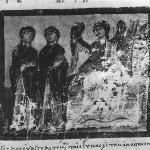As Chris mentioned in a post yesterday, a group of us are reading the Sermon on the Mount every day for Lent. (We set up a Facebook page, if you’d like to join the conversation.) Throughout the Lenten season, Chris and I will be posting occasional thoughts here about our experience with this extraordinary passage.
My wife and I read Matthew 5-7 out loud to each other yesterday morning (Ash Wednesday), and I ended up thinking about it all day. In particular, I remembered some of my early experiences with the Sermon on the Mount. When I was a teenager, I was taught–for the life of me, I can’t remember by whom–that Jesus didn’t really expect us to do a lot of the things he talked about in the gospels. There are certain things we are supposed to do, of course. But there are other things, hard things, things that are out of place in the real world, that can only be interpreted as hyperbole. Like all those times in the Sermon on the Mount when Jesus says, “You have heard it said…but I tell you…” I was taught that Jesus was taking the Law to the next level, showing us beyond a shadow of a doubt that it is so impossible to get to heaven by our own righteousness that we have no choice but to fall back on grace. Thus, for the longest time, I didn’t read Jesus’s Sermon on the Mount as a kind of State of the Union speech for the in-breaking Kingdom of God; I read it as Jesus’s most powerful verbal reminder of human depravity.
The problem with this one-sided interpretation is obvious to me now. Jesus clearly intended for us to do what he said. Jesus said, “I am the way…” (John 14:6). He said, “Anyone who loves me will obey my teaching. My Father will love them, and we will come to them and make our home with them” (John 14:23). He said, “The student is not above the teacher, but everyone who is fully trained will be like their teacher” (Luke 6:40). In John 14:12-15, Jesus said:
I tell you the truth, anyone who has faith in me will do what I have been doing. He will do even greater things than these, because I am going to the Father. And I will do whatever you ask in my name, so that the Son may bring glory to the Father. You may ask me for anything in my name, and I will do it.
If you love me, you will obey what I command.
Jesus invited people who were skeptical about his teachings to try them on for size: “Anyone who chooses to do the will of God will find out whether my teaching comes from God or whether I speak on my own” (John 7:17).
And right there in the Sermon on the Mount, Jesus says, “Therefore anyone who sets aside one of the least of these commands and teaches others accordingly will be called least in the kingdom of heaven, but whoever practices and teaches these commands will be called great in the kingdom of heaven” (Matthew 5:19). And, “everyone who hears these words of mine and puts them into practice is like a wise man who built his house on the rock” (Matthew 7:24).
A couple weeks ago, I mentioned in Sunday School that I had once been taught that Jesus didn’t actually intend for us to do the seemingly impossible things. My friends laughed at how wild that notion was. Which got me wondering: How uncommon is that interpretation of the Sermon on the Mount? (Very uncommon, I hope.) What about you? How were you taught to approach the Sermon on the Mount, including the “but I tell you” teachings about loving our enemies, not returning violence for violence, anger, oaths, etc.?
















